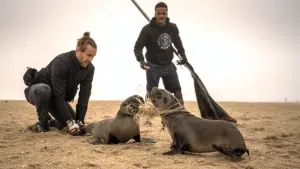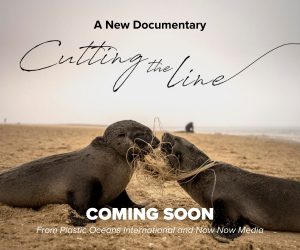Cutting the Line: A Documentary that serves as an inspirational clarion call to advocate for global policies to support communities actively fighting to mitigate and remediate ocean pollution
The Skeleton Coast, Namibia, the infamous littoral on southern Africa Atlantic Coast named for the vast numbers of shipwrecks which have come to line its shore, through history.
But now, there are new skeletons on these famous sand dunes: dead fur seals, tragically entangled on fishing lines discarded from commercial fishing.
The problem of abandoned fishing and marine debris is not a new one, but as it generally takes place far away from human eyes, on the open ocean or wild coastal fringes, its devastating effects are rarely witnessed. On the windswept, Atlantic beaches of southern Africa, marine species have been entangled for generations, but Ocean Conservation Namibia, in the shape of Naude, Katja Dreyer and their crew, are locally present in witnessing the scale of the problem. What they have seen over years on the vast, unending sand dune perimeter that is the Skeleton Coast made them realize that they could not avert their gaze.

Part of the Ocean Conservation Namibia team ready for seal rescues
Ocean Conservation Namibia: Warriors Against Abandoned Fishing Lines
OCN helps seals along the Namibian coast, cutting them free from these restraints that too often wind-up torturing and killing them. Naude and Katja were active in this work for ten years before the creation of OCN, and have since become familiar faces to millions of subscribers on YouTube, TikTok – and now a documentary film directed by Alan Van Gysen, co-produced by Plastic Oceans.
In collaboration with van Gysen’s Now Now Media, Cutting The Line is a dive into the dramatic threat of plastic pollution, telling the stories of those most affected by it, as well as examining the logistics of the issue as it’s been sustained for decades. It’s not only a story of Namibia and its seals, but also of its people – the local fishing industry is doubtlessly the main cause of the issue facing OCN, yet that same industry is an integral part of how people feed themselves and their families. The film serves as an inspirational clarion call to advocate for global policies to support communities actively fighting to mitigate and remediate ocean pollution while posing a seemingly simple question: what does it mean to close the plastic tap?

Cutting the Line – OCN Seal Ocean Conservation Namibia during a seal rescue
Dr. Charlie Rolsky, Director of Science for Plastic Oceans and Director of Research for the Shaw Institute, summarizes the conundrum: “I would love to see fishing lines made out a material that is more biodegradable, or that has less of an opportunity of entangling marine creatures. I just don’t think we can create that anytime soon. So if we’re going to reply upon these plastic nets and ropes, we need to ensure that they stay on the boat and don’t end up in the ocean as litter.”
Which leaves the likes of Ocean Conservation Namibia fighting an intractable problem. One which is evidenced for them on the shores of the country they love. And yet which in essence is generated everywhere on earth except on the beaches. They and the entangled fur seals consider home. The problem of course is that solutions are required right now. And yet that solution isn’t as simple as prohibiting fishing full-stop. It can’t be because of the impact that would cause subsistence fisheries and families. Who rely on the industry to survive. But if the alternative of creating materials that are safer and more sustainable is a non-reality for the foreseeable future. Then we inevitably find ourselves caught between a rock and a hard place.
It’s a harsh reality for the environment. One in which best practice is almost always wrapped up in an economic argument. Which postulates the immediate problem that action and policy would generate. Whilst never allowing itself to consider the future cost of environmental meltdown. A meltdown which in fact is longer really inhabits our future, much more our present.
And which necessarily leaves us all asking where hope resides in this tight ball of problematics. What can we do? – in other words.
For Now Now Media, and Plastic Oceans, at least one answer lies in telling stories. Especially stories told via the medium of film. Film which is able to inform but also inspire. In this case about the possibilities inherent in collaborations amongst local communities. NGOs, government entities and businesses to create a more balanced relationship with nature. Moving away from simply blaming one group for the environmental pitfalls. Engendered by an entire global society, and way of living. A concept woven through the film’s story as we hear from perspectives from diverse stakeholders and watch OCN harness the power of local storytelling, science and collaboration to empower global systemic change.
Because of course there is another way; there’s always been another way . And films like Cutting The Line help to inform and remind us that it is possible.
“Cutting The Line”: Informing, Inspiring and Igniting Change
Cutting The Line is available to rent for a donation of $4.99 USD. WATCH NOW
Proceeds go to Plastic Oceans International and Ocean Conservation Namibia to support community activism to remediate plastic pollution and global advocacy to mitigate global fishing waste. LEARN MORE
By Noah Geffroyd & Jon Bonfiglio
Jon Bonfiglio is a broadcast and print journalist, as well as Managing Editor for Plastic Oceans International’s written content.
Noah Geffroyd is a freelance writer from Canada, with an interest and focus on society, culture and the environment.

